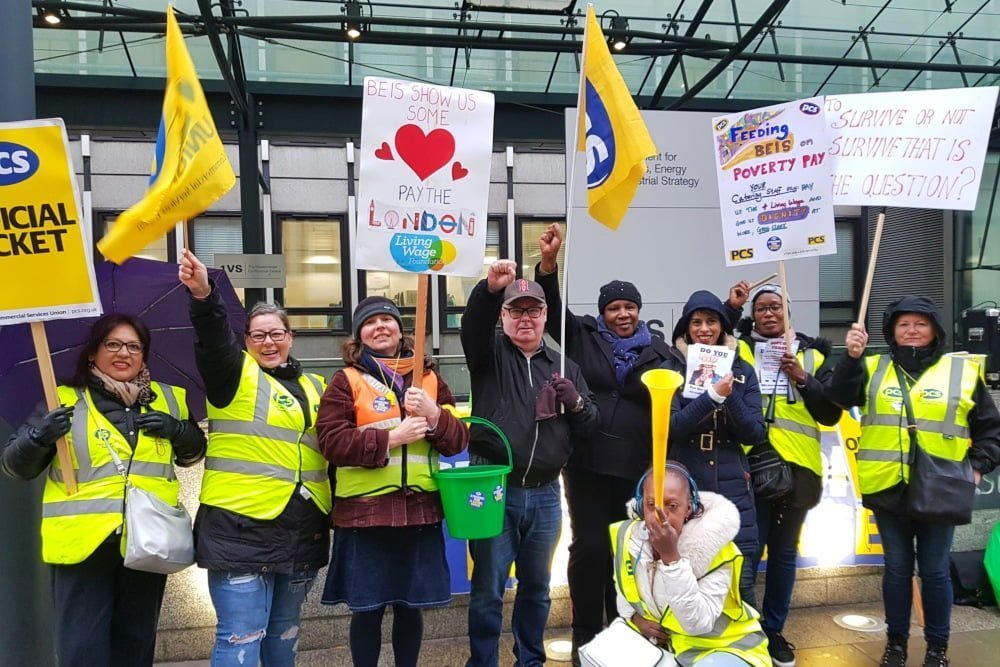Outsourced catering staff in the PCS union are fighting for decent pay and demanding to be brought back in-house. Coordinated action across the trade unions is needed to end outsourcing and the scandal of low pay.
Earlier this month, from 8-10th April, food service workers at the Department for Business, Energy and Industrial Strategy (BEIS) walked out for three days in an escalating pay dispute.
The canteen staff, who are formally employed by the outsourcing company Aramark, are demanding to be brought in-house and paid the London Living Wage (£10.55 per hour). They are also demanding increased sickness and holiday pay, as well as an additional weeks of annual leave, to give them parity with their civil service colleagues.
The workers, organised by PCS, have rejected a derisory offer of a 1p pay rise to £9.01. “With that 1p I’m going to buy a house, maybe a Ferrari”, one striker joked to the Guardian. But in reality, there is little left over once rent and travel are accounted for. “If we put in electricity and gas, we don’t eat”.
End outsourcing
On previous strike days the canteen staff were joined by security staff, porters and other support staff. However, these staff lost their legal mandate for industrial action when another outsourcing company, ISS, took over their contract earlier in the year. As things stand though, this looks unlikely to hold back the movement beyond the short term.
ISS, an outsourcing giant which employs thousands of low-paid workers across the UK, has meanwhile announced that it plans to withhold wages whilst it shifts to a new payroll system. Those affected include security guards at Barclays and Goldman Sachs; porters and caterers throughout the NHS; and many others. On the new 9th May payday, ISS staff – many of whom work 60-70 hour weeks or more – will lose a week’s pay.
The fat-cat ISS managers have promised that staff will receive all back-pay upon leaving ISS. In the meantime, they suggest their staff take out payday loans. Many of the workers have been forced to turn to food banks.
“A lot of people are doing that, though my daughter has special eating needs. I also need to look after her after work and am already doing a second job,” a cleaner at the Princess Royal Hospital told the Guardian.
The ideologues of capitalism endlessly lecture us about the ‘risk-taking’ of big business. One wonders who takes a bigger gamble coming to work: ISS CEO Jeff Gravenhorst, who took home £2m in 2018; or his staff, who sweat it for 70 hours a week and aren’t even guaranteed a wage at the end of it.
Strike to win
The PCS struggle at BEIS shows the way forward. Mark Serwotka, PCS general secretary, has promised that the union will back them if they decide to escalate. The mood on the ground is very militant, with the prospect of an all-out strike being raised.
“If they don’t [accept the demands] we are just going to press on with it,” one worker stated. “We’ve no intention of settling for anything less than £10.55, because they can pay and that is the living wage.”
The history of the trade union movement shows that the only way for workers to guarantee decent conditions is through militant action and workers’ unity. By tendering some of the strikers to ISS, the BEIS is trying to cut across this. But this may well backfire. It is increasingly obvious to workers that no matter the individual boss, the whole system is to blame.
What is needed is for the trade union leaders to launch a mass recruitment drive, and to organise for coordinated strike action across the public sector and amongst low-paid workers against outsourcing and for a proper living wage.
This should pave the way for a general strike to smash the Tory anti-trade union laws, kick out this chaotic Conservative-led government, end austerity, and bring a socialist Labour government to power.






